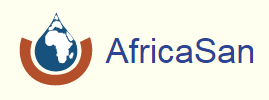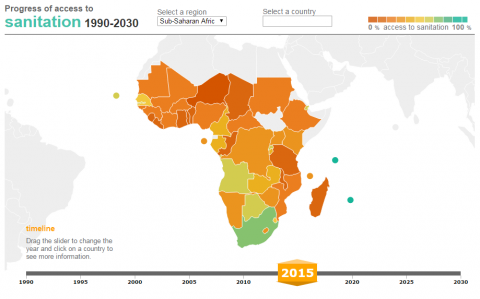Written by Esmee Russell, Coordinator of End Water Poverty, May 2015

Next week, a large number of government officials and civil society organisations will gather in Senegal for AfricaSan 4 – an event established to track and monitor the progress of African governments’ commitments to improving access to sanitation across the continent.
End Water Poverty will have a significant presence at AfricaSan, and will be holding workshops and side events, along with several of our members. This is because we feel this is an important opportunity to raise awareness through a united civil society voice and call for change. We want to bring attention to the fact that while levels of access to water and sanitation are increasing across Africa, there are still significant inequalities as many groups are not being prioritised. The poor and the marginalised, such as families living in rural areas, communities living in slums, the elderly and the disabled, are being neglected and left behind, with governments failing to meet their needs.
Africa has made limited progress in providing its people with access to basic sanitation. Coverage only increased from 35% in 1990, to 40% in 2010, equal to 189 million people gaining access. With a population growth of almost 400 million people since 1990, the population without an improved sanitation facility increased by almost 200 million people to 612 million in 2010. With a doubling of the urban population over the period 1990-2010, more than 1 in 4 people in urban areas rely on shared or public sanitation facilities. Little over 1 in 5 people in Africa still practise open defecation, down from 1 in 3 in 1990.Source: A Snapshot of Drinking Water and Sanitation in Africa – 2012 Update A regional perspective based on new data from the WHO/UNICEF Joint Monitoring Programme for Water Supply and Sanitation http://www.wssinfo.org/fileadmin/user_upload/resources/Africa-AMCOW-Snapshot-2012-English-Final.pdf

This goes against the human right to water and sanitation, which was established as an international law in 2010, legally binding governments to fulfil their obligations. The right means that everyone is entitled to sanitation which is safe, accessible, acceptable, affordable and available and that those most in need must be prioritised. It also states that governments must work to eliminate crippling inequalities and must prioritise those most in need.
In 18 countries in sub-Saharan Africa a less than a quarter of the population uses an improved sanitation facility. Only eight countries in Africa are on track for meeting the MDG sanitation target.
This means governments from across Africa are not doing enough to ensure everyone has access to safe and sustainable sanitation services, and are failing to fulfil their obligations.
During AfricanSan, we will be calling on governments to commit, and to take urgent action, to ensure that those most in need are prioritised and that the right to water and sanitation is realised as soon as possible. We hope the declaration from AfricaSan will prioritise the most vulnerable, so that we can truly ensure that the right is realised for everyone.
Follow us on Twitter @EndWaterPoverty and on this website for more information, blogs and updates from AfricaSan. All graphics are taken from WASHwatch.org
For all information on the AfricaSan programme, visit www.africasan.com